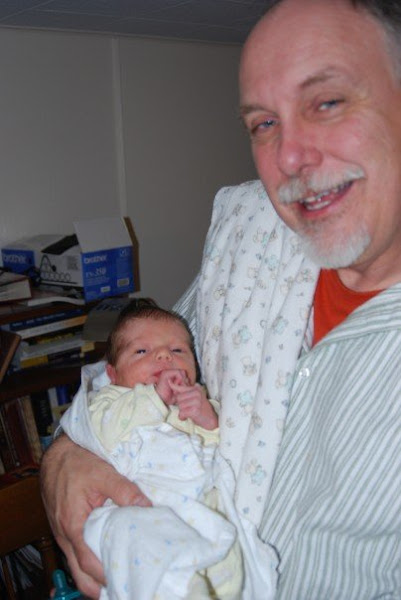Back after the crazy season.
If you're my age, you might remember that book from the early 80s by Christian education guru John Westerhoff III, Will Our Children Have Faith? I don't remember the book being all that useful, but the question has stuck with me. I guess what's brought it on is having just returned from a week long visit with my 14 month old grandson. His daddy is in seminary, studying for the ministry -- and I really wonder about the future of the church that they will be a part of.
A few other bits of grist for this mill. A while back, I read a short article by Nancy Ammerman in the Canadian version of Touchstone magazine, in which she wondered if Christians (especially the Protestant variety) have not pretty much given up on passing on their story to their children. The Sunday morning worship service with concurrent Sunday School is the norm and that's pretty much all the contact kids have with the church. Jews, Muslims, and other faith communities expect that children will be instructed in their religion outside the main gathering time of the week.
Robert Louis Wilken wrote in the last issue of First Things a perceptive comparison of Christianity and Islam. Islam has always understood itself to be a public religion in the sense that Islamic practice is lived out visibly. In the ideal of the Islamic state, religious practice becomes the cultural and legal norm. Christianity has evolved in a much different way, but, according to Wilken, it now finds itself at a disadvantage in terms of the future because in Europe and North America (excluding parts of the US) it has pretty much disappeared from the public square. Wilken has a particular Roman Catholic slant on things, but he's a wise guy, very learned, and I think he's got a point.
I alternate between days of optimism and days of discouragement and today I'm sliding towards the discouragement end of the scale. Faith is not just assent to a list of beliefs, but the deep imbibing of a narrative, a story, which becomes one's own story only after long exposure. The vast majority of Canadian children have been completely cut off from the Christian story to the point where even the traditional icons of Christmas have little or no meaning to them. And in our churches, we have capitulated to such an extent to aggressively proselytizing Sunday sports and other voracious activities, and have dumbed down our Christian education to accomodate teachers and parents who will make only the briefest commitment of time and effort, and we have abandoned age-old practices like family devotions -- so I really wonder what's going to become of the story in which faith has always taken root and grown.
Anybody out there want to try to cheer me up -- or just commiserate?
Thursday, January 15, 2009
Will our children have faith?
Subscribe to:
Post Comments (Atom)


3 comments:
Hey Paul,
Is it discouraging to you if the people are ready to rise above the Christian stories and just consider how to do the best things for their families and communities? Maybe that's living Christianity- or whatever you need to call it - and maybe that's the bet hope for all our futures.
Paula
Hi Paula. Thanks for the comment. I guess I would say that there is something essential in the Christian story that shows us what it means to do the best things for our families and communities. And beyond that, Jesus also talked about doing the best thing for the neighbor that happens to cross your path -- the Samaritan. Apart from God's grace, which we learn about through the shared story of faith, it's hard to know what "the best thing" is.
Strangely, though, a lot of non- Christian's live right, and do right, too. I have no quarrel with Christianity, unless it's used as an excuse for murder, hatred, war, etc. I know that much good has been done through the influence of the Christian churches. But, in my worldview everyone, regardless of their faith or lack thereof, seems to inately have a sense of right and wrong, and everyone can be encouraged to respect that inate sense, with or without a religion to back it up. If your Christian centric view leads you to choose to believe that that sense is the essence of Christ or God or whatever,that's okay, too. But, we can accept all ways of belief- the important thing is to think about our actions and their impacts on the world and all it's creatures.
Paula
Post a Comment